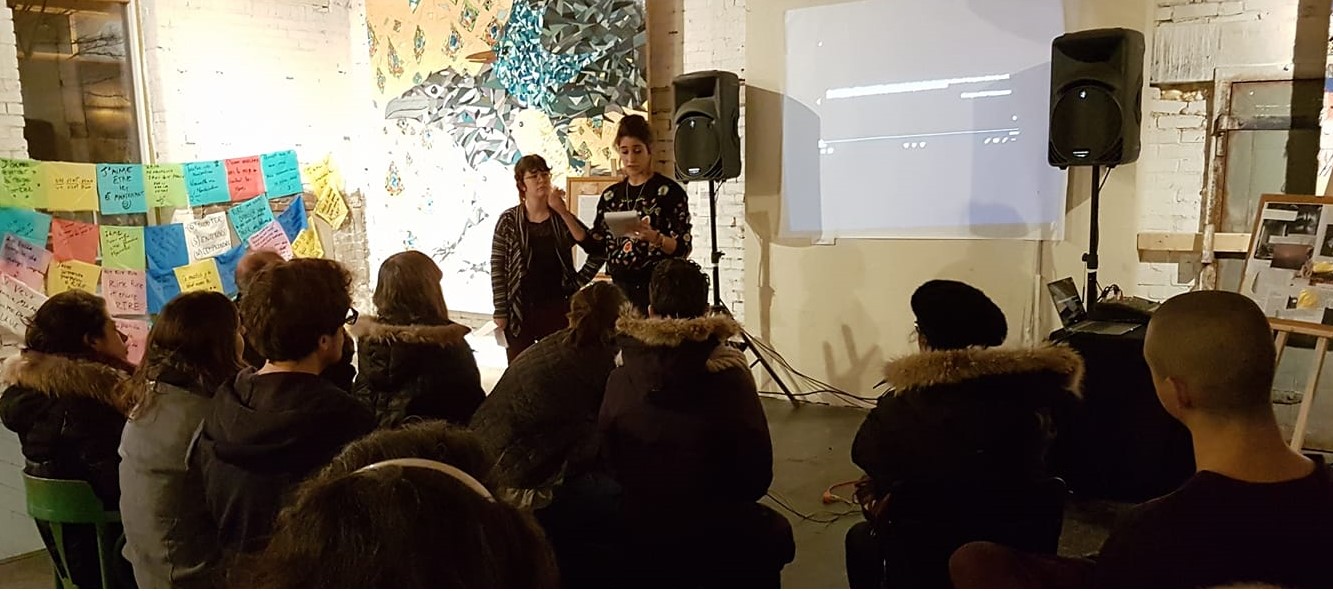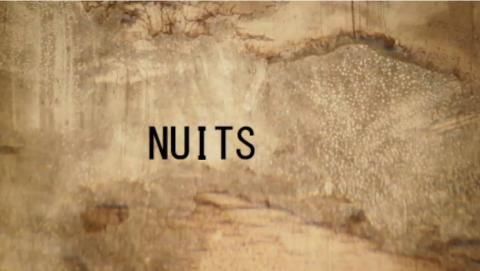Submitted by Jason Pare on
Texte : Tiphaine Barrailler et Bianca Laliberté
Pour mieux comprendre la démarche derrière la création de l'oeuvre vidéo NUITS, captée dans le cadre du programme Biblio-libre d’Exeko, à partir d’une cocréation littéraire réunissant neuf auteur.trice.s rencontré.e.s dans divers organismes communautaires, nous vous invitons à lire le texte suivant rédigé par les médiatrices Tiphaine Barrailler et Bianca Laliberté.
« Nous sommes dans une situation généralisée de perte de repères communs. Les grands modèles de pensée se sont effondrés, consumés par le recul de la religion et la dissémination victorieuse de l’individualisme néolibéral. Nous nous retrouvons perpétuellement confrontés à un monde fragmenté (par la sur-stimulation médiatique, l’omniprésence de discours multiples, babéliques). Or, en cet immense espace de jeu cadençant le visible et l’invisible, ce film n’est autre qu’une tentative de rendre audibles et visibles des voix désirantes rencontrées en des lieux insoupçonnées. Dans l’antre de la nuit, nous ciblons Babel heureuse, ou du moins décomplexée. »
Dans le cadre du projet Biblio-libre de l’édition 2017, dix ateliers de médiation intellectuelle ont eu lieu dans 6 organismes communautaires de la Ville de Montréal et à la BAnQ, tous préoccupés par les enjeux de l’itinérance. En chacun de ces organismes trônent des bibliothèques sans propriétaires installées par Exeko au courant des dernières années. Leur existence garantit en ces espaces un libre accès à des livres et vise précisément à cultiver la littératie et la vie intellectuelle dans une perspective d’émancipation et d’inclusion sociale.

Présentation du film NUITS par Tiphaine Barrailler et Bianca Laliberté lors de l'exposition 2915 le 9 mars 2018.
Cependant, la matière du livre, comme objet d’échange, pose problème : il est quasi-impossible de la saisir toute entière dans les contextes d’ateliers de deux heures. Comme les ateliers de médiation intellectuelle mobilisent des groupes d’individus autour d’objets communs de réflexion dans une perspective éducative prise en charge par tout un chacun, les fragments de livres arborent une double opportunité pour la création d’un commun lequel, assumons-nous, n’existe pas avant d’être pratiqué, articulé, manipulé, pétri, façonné. Ainsi est-il toujours question de se donner les moyens de l’engendrer. Comment jouer et rejouer le sens au creux de la dispersion qui organise notre expérience contemporaine? Voire, comment œuvrer à une construction commune de sens ? Comment manipuler la matière livresque dans la perspective d’une écriture à plusieurs en des contextes qui s’y ne prêtent pas aussi bien qu’en une université, par exemple? Dans le contexte précis de ce projet, le commun fut d’une part envisagé comme espace partagé au moment des ateliers où se multiplièrent les discussions érudites. Ensuite, en tant que patrimoine culturel proposé à l’appropriation que l’on peut sans gêne nommer « la grande culture occidentale » au terme d’un geste d’écriture.

La présence des fragments dont la jonction thématique est la nuit (images, éclats de pensées philosophiques, bribes de romans) se joue ici sur deux trames. La trame vidéographique, d’abord, les donnent à voir, constituée de matières pelliculaire agencées par Charles-André Coderre, parmi lesquelles des images captées lors de l’enregistrement. Puis, la trame audio, corps composé de neuf voix singulières, les donnent à entendre. Chaque texte fut en effet rédigé en écho à de petites séries de fragments de livres sélectionnés par les auteur.trice.s eux-mêmes/elles-mêmes dans le processus d’écriture. Ces auteur.trice.s rencontré.e.s dans les divers organismes visités sont: Michel Beaupré, Josée Cardinal, J-M Fortin, Robert Quenneville, Yves Manseau, Mostapha, Sylvain, Cindy Tremblay et Vangolet. Sur cette trame, s’ajoute la musique de Frédéric Boisclair.
Ce projet a été réalisé grâce au soutien financier du Ministère de la Culture et des Communications et de la Ville de Montréal dans le cadre de l’Entente sur le développement culturel de Montréal.
Nous tenons également à remercier l'Auberge Madeleine, la BAnQ, Chez Doris, La Maison du Père, L’Itinéraire, la Mission Old Brewery, ainsi que le PAS de la rue pour leur précieuse collaboration au projet.











 Laurier
Laurier